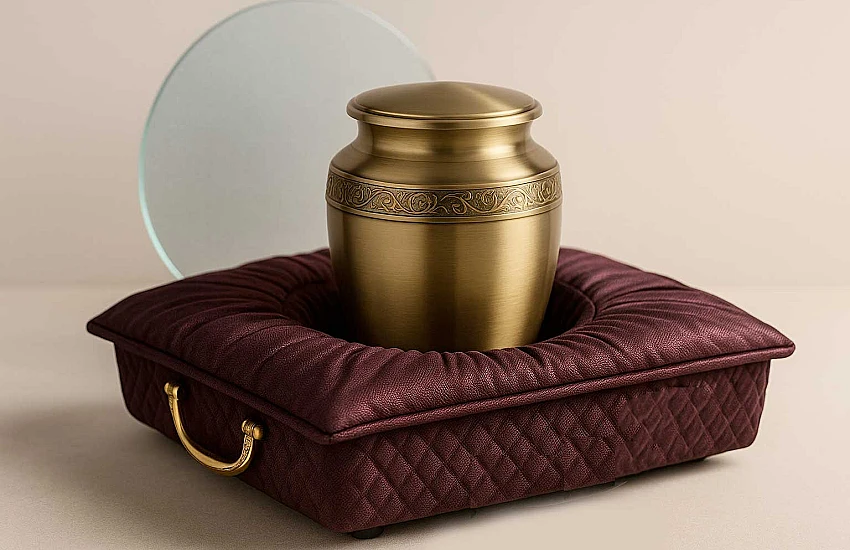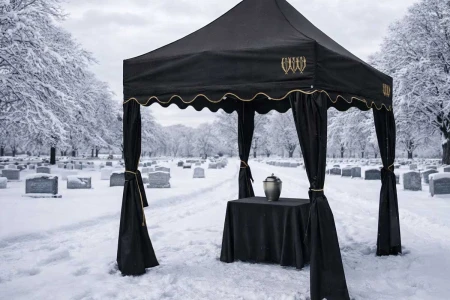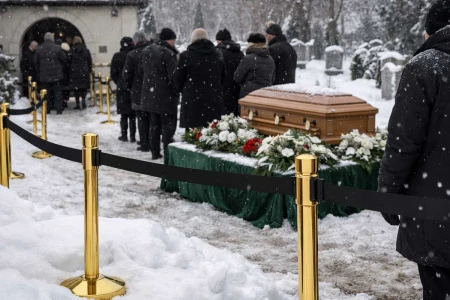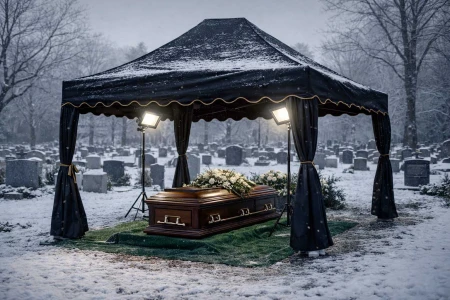Table of Contents
- Funeral Urns and Accessories – History, Symbolism, and Modern Funeral Solutions
- What is a Funeral Urn and Why is it Important?
- The Origins of Cremation – A Brief History of Fire and Remembrance
- Urn Burial Traditions in Poland and Around the World
- Why Choose an Urn Burial?
- How to Choose the Suitable Accessories for an Urn
- Urn Carriers – Elegant Support for a Dignified Farewell
- FAQ – Frequently Asked Questions About Funeral Urns and Accessories
- Conclusion – Memory That Lasts
Discover the symbolism of funeral urns, the history of cremation, and the importance of an elegant setting for the farewell ceremony. Learn why an urn carrier is not just a practical addition, but a vital element of a dignified burial.
Funeral Urns and Accessories – History, Symbolism, and Modern Funeral Solutions
The modern funeral industry is undergoing a dynamic transformation. As lifestyles and approaches to spirituality evolve, many people are choosing cremation as their preferred method of burial. This decision brings with it new needs and funeral accessories, such as funeral urns and the essential additions that help organize a dignified and symbolic farewell ceremony.
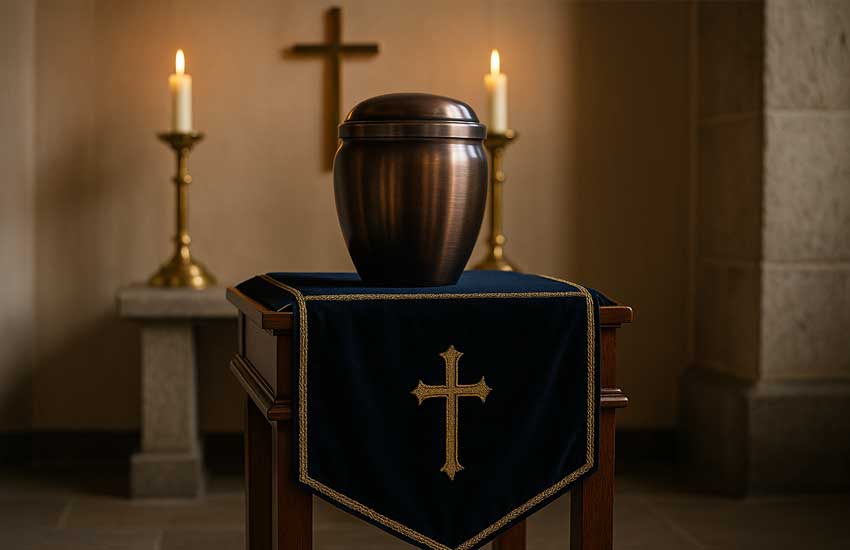
What is a Funeral Urn and Why is it Important?
A funeral urn is a special container used to hold the ashes of the deceased after cremation. Its role goes beyond mere utility—it serves as a deep symbol of spiritual presence, intimate remembrance, and final farewell.
Urns come in various shapes, colors, and styles—from classic and minimalist to modern or eco-friendly. This variety allows every family to choose an urn that aligns with personal beliefs, aesthetics, or family traditions.
The Role of the Urn in the Funeral Ceremony
In cremation funerals, the urn replaces the traditional casket. It may be placed on a catafalque, in a special stand, or set in a columbarium niche. During the ceremony, the urn becomes the central focus for the family and friends, around which emotions, prayers, and memories are centered.
The Origins of Cremation – A Brief History of Fire and Remembrance
Cremation in Ancient Times
Cremation has been a known form of burial for thousands of years. Archaeological findings show that people living in Europe during the Bronze Age practiced body cremation and placed the ashes in ceramic urns. Similar customs existed in ancient Egypt, Greece, and Rome.
For many ancient civilizations, fire symbolized purification and the soul's passage into the afterlife. Ashes were kept in decorative urns, often placed in family tombs or columbariums.
Medieval Decline and Modern Revival
With the rise of Christianity, cremation was replaced by traditional burials. For centuries, it was considered incompatible with the belief in bodily resurrection. Only in the 19th century, primarily for sanitary and urban reasons, did the practice begin to return in Europe.
Cremation Today – A Growing Choice
Today, cremation is chosen by more and more families. It is seen as more ecological, practical, and symbolic. Each year, the number of people opting for this type of burial increases for personal, philosophical, or pragmatic reasons.
The Ecological Future of Cremation – The Urn that Gives New Life
Fully biodegradable urns made from cellulose, paper, bamboo, or natural resins are increasingly popular. Some contain seeds from which a memory tree grows—a beautiful symbol of life after life.
Urn Burial Traditions in Poland and Around the World
Urn Burials in Polish Funeral Culture
Polish cemeteries are increasingly adapted for urn burials—in traditional urn graves or columbariums. Many families choose urn burials to preserve the symbolic dimension of the ceremony while reducing costs and gaining flexibility.
Urn Culture Worldwide
In countries like Japan, India, and the Scandinavian nations, cremation is the dominant form of burial. Alternative methods are also gaining popularity, such as scattering ashes at sea, planting a tree with an urn, or using eco-urns that dissolve completely in the earth.
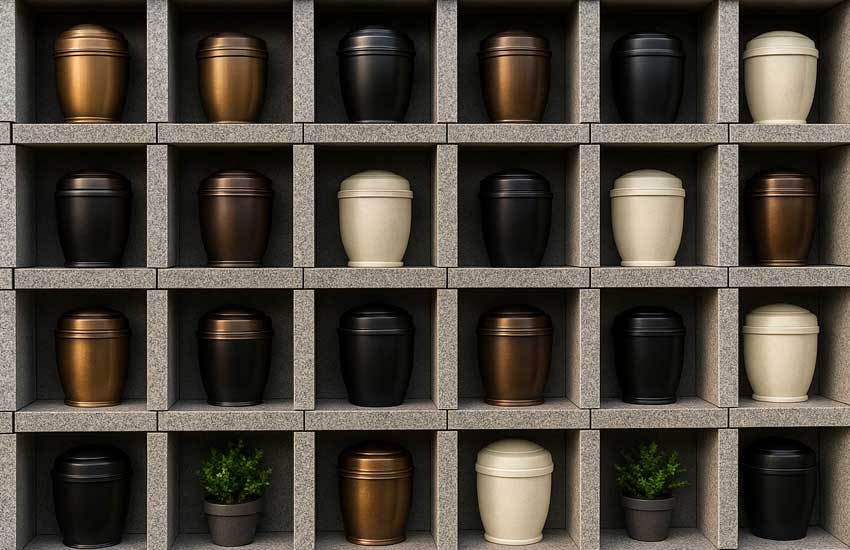
Why Choose an Urn Burial?
Flexibility and Intimacy
An urn allows the ceremony to be held at any place and time. Families may choose to bury it in a family grave, a columbarium, a special niche, or in nature—depending on legal regulations.
Ecology and Environmental Awareness
Cremation and urns take up significantly less space than traditional burials. Additionally, biodegradable urns are available, supporting the idea of green funerals.
Lower Burial Costs
Cremation-related costs are often lower than those for traditional funerals—there's no need for a casket, procession, or full cemetery plot.
Personalization
An urn can reflect the lifestyle, passions, or beliefs of the deceased. Some feature engraved quotes, religious symbols, or compartments for photos and mementos.
How to Choose the Suitable Accessories for an Urn
Each element of the ceremony should be thoughtfully chosen. When selecting urn accessories, consider:
- The type of ceremony (secular or religious)
- The location of urn presentation (chapel, funeral home, columbarium)
- The overall floral and decorative arrangement
Most Common Urn Accessories:
- Urn stands
- Urn carriers
- Catafalques
- Funeral drapes
- Lanterns or candle holders
- Embroidered sashes
Urn Carriers – Elegant Support for a Dignified Farewell
An urn carrier is a functional and elegant funeral accessory used to display and transport the urn during the ceremony. It ensures a dignified presentation and secure placement on a catafalque, altar, or chapel pedestal.
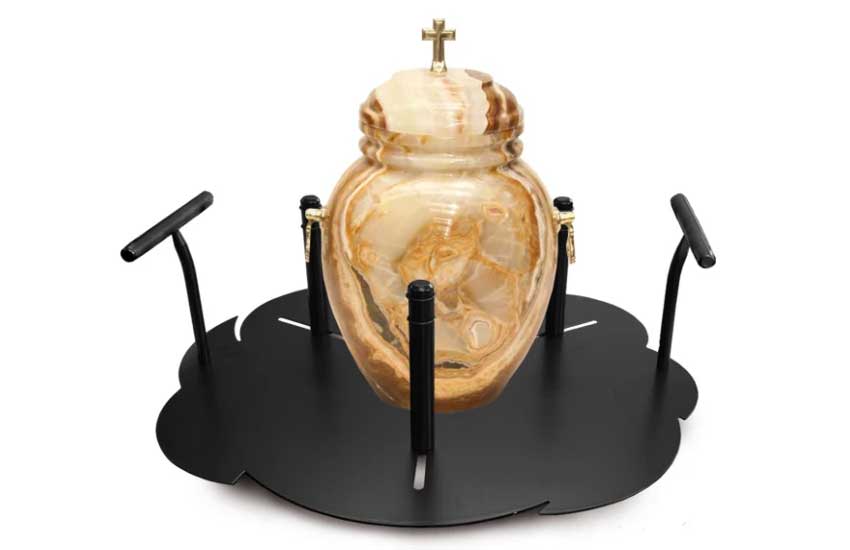
Types of Urn Carrier – Practical and Elegant Options
At funeralne.com, you’ll find a variety of urn carriers tailored to different types of ceremonies and urn styles:
- Classic carriers – simple, subdued, often velvet-covered, in black, navy, or burgundy
- Religious-themed carriers – featuring crosses, sacred embroidery, or floral details
- Two-part carriers – foldable models, easy to store and transport
- Handle-equipped carrier – allowing multiple mourners to carry the urn safely
Why Choose an Urn Carrier?
- Elevates the ceremony – the urn gains the dignity and attention it deserves
- Safety – prevents the urn from tipping over
- Aesthetic value – integrates beautifully with the ceremony’s decor
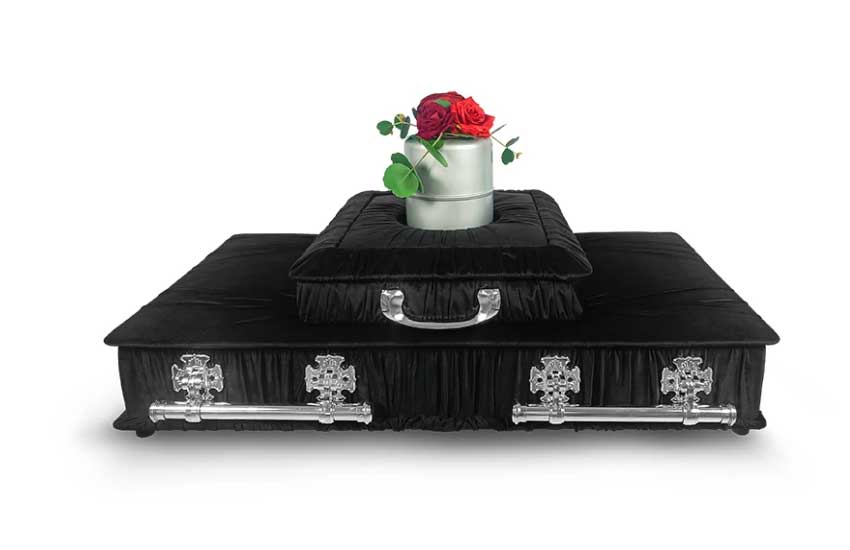
Complete Set – Urn Base and Carrier
Among the available accessories at funeralne.com, the Urn Base and Carrier Set stands out for its elegant combination of function and form. This carefully designed set is ideal for cremation ceremonies held in a chapel, church, or cemetery. The sturdy base ensures secure placement of the urn, while the matching carrier allows for dignified and safe transport. Its deep-toned velvet finish and refined appearance enhance the solemnity of the occasion, making it a tasteful and professional choice for a respectful farewell.
Black Urn Carrier– Elegance in Simplicity
Another notable option is the Black Urn Carrier, also available at funeralne.com. This model features a minimalist yet elegant design—crafted from durable materials and finished in classic black, it complements any ceremonial setting. The carrier not only serves an aesthetic purpose but also provides stability and support when carrying or displaying the urn. It’s a practical and dignified choice for those who appreciate simplicity imbued with meaning and grace.
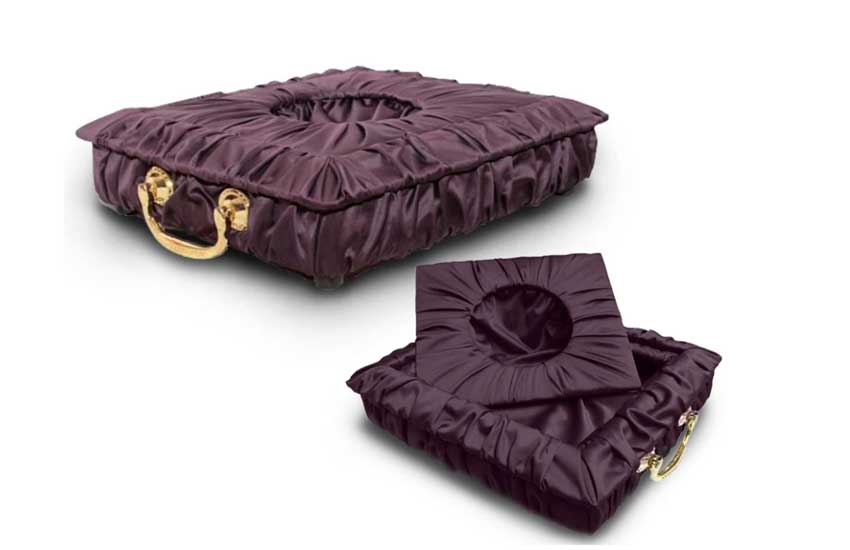
FAQ – Frequently Asked Questions About Funeral Urns and Accessories
How does an urn burial differ from a traditional funeral?
An urn burial involves cremation followed by the placement of ashes in an urn. The ceremony may resemble a traditional funeral in format.
Can an urn be buried in a family grave?
Yes, an urn can be placed in an existing family grave if space allows.
What types of urns are available on the market?
Urns vary in material (ceramic, metal, wood, glass, biodegradable), style, and intended use.
What is an urn carrier and what is it for?
It’s an elegant platform for transporting and displaying the urn during the funeral ceremony.
Are urn carriers one-size-fits-all?
Most are universal, but it's important to ensure compatibility with your chosen urn.
How do I choose the right accessories for an urn?
Match them to the style of the ceremony and urn, and to the decor of the chosen location.
Can an urn be kept at home?
In Poland, this is only possible in exceptional cases and must comply with cemetery law.
Conclusion – Memory That Lasts
A funeral urn is more than a vessel for ashes—it’s a symbol of love, remembrance, and the final farewell. With the right accessories, such as the elegant urn carriers available at funeralne.com, you can organize a ceremony that is dignified, emotionally rich, and aligned with tradition while remaining open to spiritual individuality.

